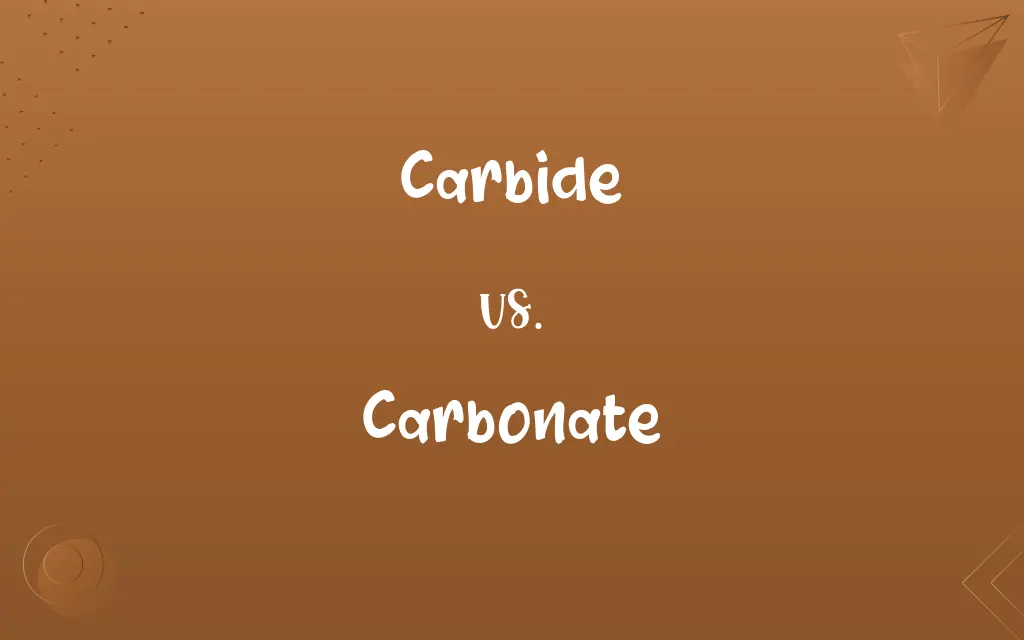Carbide vs. Carbonate: Know the Difference

By Dua Fatima & Shumaila Saeed || Updated on March 5, 2024
Carbide refers to compounds of carbon with a less electronegative element, known for hardness, while carbonate is a salt of carbonic acid, characterized by the presence of the CO3 ion.

Key Differences
Carbides are composed of carbon and a more electropositive element, typically metals, and are noted for their extreme hardness and high melting points. These materials are essential in industrial applications for cutting tools and abrasives. On the other hand, carbonates are salts or esters of carbonic acid and contain the carbonate ion (CO3^2-), playing a significant role in geological processes and the carbon cycle.
Dua Fatima
Mar 05, 2024
While carbides are crucial in the manufacturing sector, particularly for the production of tools that can cut through metals and other hard materials, carbonates are fundamental to environmental science. Carbonates contribute to the formation of sedimentary rocks like limestone and are involved in buffering pH in aquatic environments.
Shumaila Saeed
Mar 05, 2024
The chemical structure of carbides can vary, leading to different types such as calcium carbide, which reacts with water to produce acetylene gas. This reaction is pivotal in the production of synthetic rubber and plastics. Conversely, carbonates like calcium carbonate are a major component of marine shells and coral, supporting marine ecosystems and the global carbon dioxide balance.
Dua Fatima
Mar 05, 2024
Carbides react with water to release acetylene, a flammable and industrially significant gas. This property is exploited in welding and metal cutting applications. Carbonates, whereas, often react with acids to produce carbon dioxide, a reaction that is essential in geological weathering processes and has implications for carbon sequestration.
Dua Fatima
Mar 05, 2024
Carbides are synthesized through high-temperature processes, reflecting their stability and resilience, which is why they are employed in harsh industrial conditions. In contrast, carbonates can form through biological and geological processes at lower temperatures, illustrating their widespread occurrence in nature and importance in biological calcium regulation and rock formation.
Dua Fatima
Mar 05, 2024
ADVERTISEMENT
Comparison Chart
Composition
Carbon with a more electropositive element
Salts of carbonic acid, CO3 ion
Shumaila Saeed
Mar 05, 2024
Primary Use
Industrial applications (cutting tools, abrasives)
Geological, environmental processes
Dua Fatima
Mar 05, 2024
Chemical Reactivity
Reacts with water to release acetylene
Reacts with acids to produce CO2
Dua Fatima
Mar 05, 2024
Formation Process
High-temperature synthesis
Biological and geological processes
Dua Fatima
Mar 05, 2024
ADVERTISEMENT
Carbide and Carbonate Definitions
Carbide
A compound of carbon with a less electronegative element.
Silicon carbide (SiC) is used in ceramic materials.
Shumaila Saeed
Mar 05, 2024
Carbonate
A salt of carbonic acid.
Sodium carbonate is used in glass manufacturing.
Shumaila Saeed
Mar 05, 2024
Carbide
Known for extreme hardness.
Tungsten carbide is used in making drill bits.
Dua Fatima
Mar 05, 2024
Carbonate
Contains the carbonate ion (CO3^2-).
Carbonate minerals are widespread in rocks.
Dua Fatima
Mar 05, 2024
Carbide
Reacts with water to produce acetylene.
Calcium carbide is used in lamps for mining.
Shumaila Saeed
Mar 05, 2024
ADVERTISEMENT
Carbonate
Reacts with acids to produce carbon dioxide.
Limestone (calcium carbonate) reacts with hydrochloric acid.
Dua Fatima
Mar 05, 2024
Carbide
High melting points.
Carbides are utilized in tools that withstand high temperatures.
Dua Fatima
Mar 05, 2024
Carbonate
Essential in geological processes.
Carbonate sediments form the basis of coral reefs.
Hifza Nasir
Mar 05, 2024
Carbide
Used in industrial applications.
Carbide tips are preferred in cutting tools for their durability.
Dua Fatima
Mar 05, 2024
Carbonate
Contributes to the carbon cycle.
Marine carbonates play a role in sequestering atmospheric CO2.
Hifza Nasir
Mar 05, 2024
Carbide
A binary compound consisting of carbon and a more electropositive element, especially calcium.
Dua Fatima
Oct 19, 2023
Carbonate
To add carbon dioxide gas to (a beverage) so that bubbles are produced upon release from a container.
Dua Fatima
Oct 19, 2023
Carbide
Any of various hard durable materials made of compacted binary compounds of carbon, especially those with silicon, boron, or a heavy metal, used as abrasives and in tools that cut metal.
Dua Fatima
Oct 19, 2023
Carbide
A binary compound of carbon with some other element or radical, in which the carbon plays the part of a negative; - formerly termed carburet.
Dua Fatima
Oct 19, 2023
Carbonate
The anionic divalent group CO3, derived from carbonic acid, or a compound containing this group.
Dua Fatima
Oct 19, 2023
Carbonate
A salt or carbonic acid, as in limestone, some forms of lead ore, etc.
Dua Fatima
Oct 19, 2023
Repeatedly Asked Queries
Can carbide be used in all types of cutting tools?
Yes, carbide is used in various cutting tools for metals and other hard materials due to its extreme hardness.
Dua Fatima
Mar 05, 2024
How do carbides react with water?
Carbides react with water to produce acetylene gas, used in welding and synthetic rubber production.
Dua Fatima
Mar 05, 2024
Do carbonates have any industrial uses?
Yes, carbonates are used in industries like glass manufacturing and as a buffering agent in swimming pools.
Dua Fatima
Mar 05, 2024
What makes carbides so hard?
The strong chemical bonds between carbon and the electropositive element contribute to carbides' hardness.
Dua Fatima
Mar 05, 2024
How are carbonates formed?
Carbonates can form through biological secretion by marine organisms or geological processes.
Dua Fatima
Mar 05, 2024
Why are carbonates important in geology?
Carbonates are crucial in studying sedimentary rock formations and understanding Earth’s geological history.
Shumaila Saeed
Mar 05, 2024
Can carbides be found in nature?
Some carbides, like silicon carbide, can be found in nature, though they are rare.
Hifza Nasir
Mar 05, 2024
What is the difference in reactivity between carbides and carbonates?
Carbides generally react with water to produce gases, while carbonates react with acids to release CO2.
Dua Fatima
Mar 05, 2024
What is carbide used for?
Carbide is used in industrial applications for making cutting tools and abrasives due to its hardness.
Shumaila Saeed
Mar 05, 2024
What are carbonates, and where are they found?
Carbonates are salts of carbonic acid, found in rocks, marine shells, and coral.
Dua Fatima
Mar 05, 2024
What role do carbonates play in the environment?
Carbonates contribute to the carbon cycle, rock formation, and pH buffering in aquatic ecosystems.
Shumaila Saeed
Mar 05, 2024
How are carbonates involved in the carbon cycle?
Carbonates sequester CO2 in marine environments and contribute to the formation of sedimentary rocks.
Hifza Nasir
Mar 05, 2024
Is calcium carbide dangerous?
Calcium carbide can be dangerous as it reacts with water to release flammable acetylene gas.
Hifza Nasir
Mar 05, 2024
How do carbides and carbonates contribute to their respective fields?
Carbides are vital in industrial manufacturing for their durability and hardness, while carbonates play a key role in environmental processes and geology.
Hifza Nasir
Mar 05, 2024
Are all carbides the same in composition?
No, carbides can vary in composition, combining carbon with different electropositive elements.
Dua Fatima
Mar 05, 2024
Share this page
Link for your blog / website
HTML
Link to share via messenger
About Author
Written by
Dua FatimaCo-written by
Shumaila SaeedShumaila Saeed, an expert content creator with 6 years of experience, specializes in distilling complex topics into easily digestible comparisons, shining a light on the nuances that both inform and educate readers with clarity and accuracy.





































































